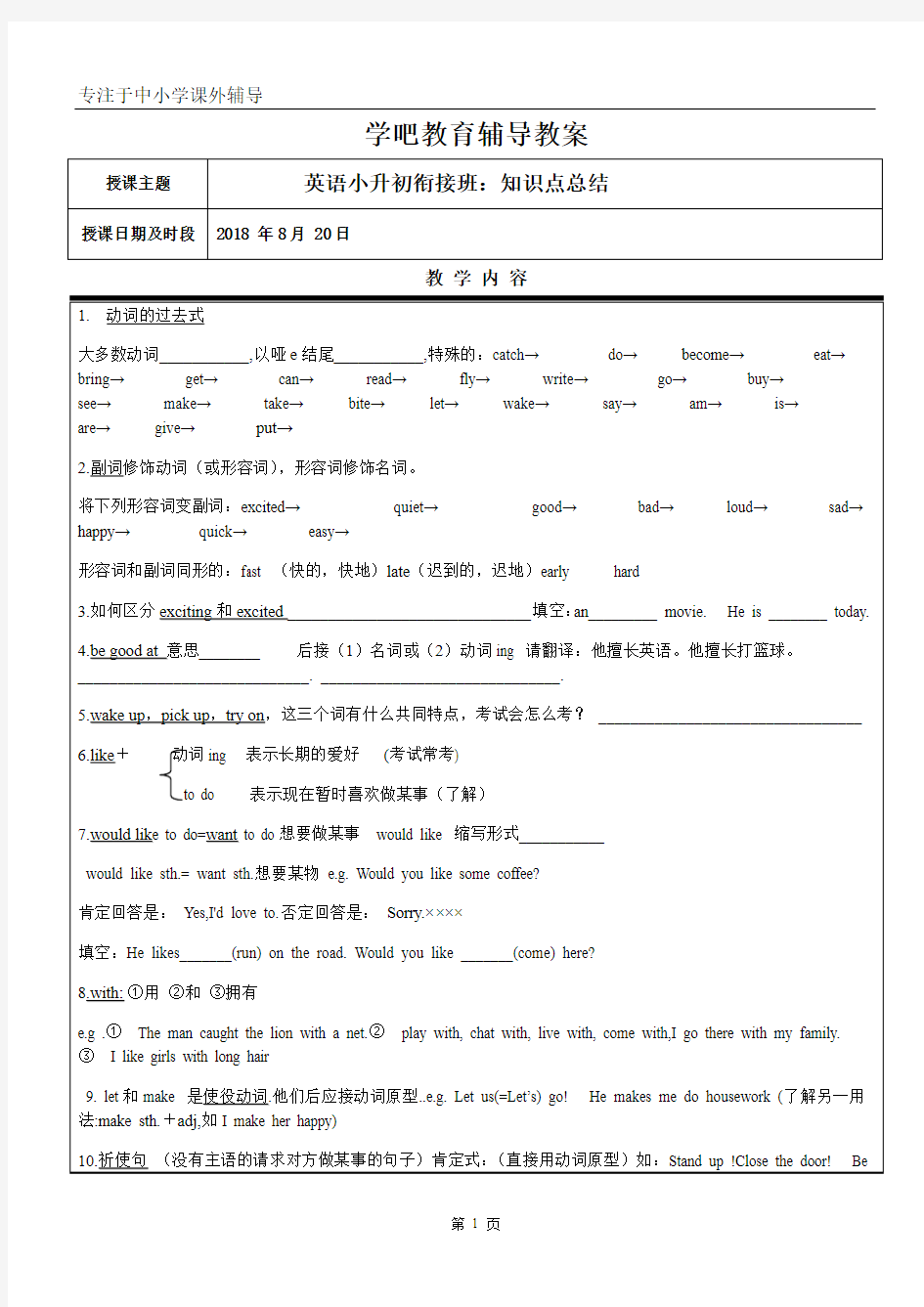
小升初英语衔接教案15知识点总结
- 格式:doc
- 大小:118.00 KB
- 文档页数:8


学吧教育辅导教案
授课主题英语小升初衔接班:知识点总结
授课日期及时段2018 年8月 20日
教学内容
1.动词的过去式
大多数动词___________,以哑e结尾___________,特殊的:catch→ do→ become→ eat→ bring→ get→ can→ read→ fly→ write→ go→ buy→
see→ make→ take→ bite→ let→ wake→ say→ am→ is→
are→ give→ put→
2.副词修饰动词(或形容词),形容词修饰名词。
将下列形容词变副词:excited→ quiet→ good→ bad→ loud→ sad→ happy→ quick→ easy→
形容词和副词同形的:fast (快的,快地)late(迟到的,迟地)early hard
3.如何区分e x c i t i n g和e x c i t e d______________________________填空:an_________ movie. He is ________ today.
4.b e g o o d a t意思________ 后接(1)名词或(2)动词ing 请翻译:他擅长英语。他擅长打篮球。
_____________________________. ______________________________.
5.w a k e u p,p i c k u p,t r y o n,这三个词有什么共同特点,考试会怎么考?_________________________________
6.l i k e+动词ing 表示长期的爱好(考试常考)
to do 表示现在暂时喜欢做某事(了解)
7.w o u l d l i k e to do=w a n t to do想要做某事would like 缩写形式___________
would like sth.= want sth.想要某物e.g. Would you like some coffee?
肯定回答是:Yes,I'd love to.否定回答是:Sorry.××××
填空:He likes_______(run) on the road. Would you like _______(come) here?
8.w i t h:①用②和③拥有
e.g .①The man caught the lion with a net.②play with, chat with, live with, come with,I go there with my family.
③I like girls with long hair
9. let和make 是使役动词.他们后应接动词原型..e.g. Let us(=Let’s) go! He makes me do housework (了解另一用法:make sth.+adj,如I make her happy)
10.祈使句(没有主语的请求对方做某事的句子)肯定式:(直接用动词原型)如:Stand up !Close the door! Be
careful!Keep quiet!否定式:(直接在动词前加don't):Don’t eat in the library!Don't be afraid 别害怕
11.助动词d o后面用动词原型、
1、He likes hamburgers.变否定:He ____ _____hamburgers.变疑问:_____ he _____ hamburgers? Yes, he _____
2、I went swimming yesterday. 变否定I _____ ______ swimming yesterday. 变疑问:_____ you______ swimming
yesterday? No, I ______.
14. ①k e e p sth.+adj.(形容词) 保持某物某种状态
②keep+adj.= stay+adj.(形容词)保持某种状态
如: keep healthy / quiet/tidy stay healthy/clean/…
15.动词和介词后面如果用人称代词的话用宾格形式、如:
He likes(动词)me(宾格).Don’t play with(介词)her(宾格).
16. 主格、宾格、形容词性物主代词和名词性物主代词。(会背会用)
主格I you he she it we you they
宾格
形容物
代
名词物
代
形容词性物主代词+名词=名词性物主代词
17. 时间介词a t/o n/i n
⑴ in:年;季节;月;一天中的早中晚
如:in 1964 ;in summer; in December; in the morning/afternoon/evening
⑵on:日期;星期;具体某一天的早中晚/带day
on 24th July, on Sunday, on a winter evening, on a Monday morning
⑶at:钟表时刻;不带day的节日;夜里,中午
如: at half past ten, at 8o' clock, at Christmas/Chinese New Year/
Spring Festival/Dragon Boat Festival/Halloween/Easter/Mid-autumn Fest ival/Qingming Festival…at noon/at night
18.s l e e p和s l e e p y
sleepy: 困倦的feel sleepy sleep:①n.睡觉②v.睡觉